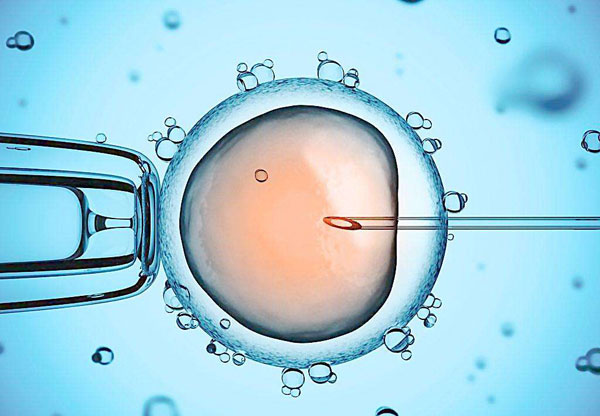当前位置: Language Tips> 双语新闻
Artificial human life could soon be grown in lab after embryo breakthrough
近日,《科学》杂志在线报道称,剑桥大学的科学家们通过使用两种干细胞以及一个三维支架,成功地创造出了一个能够自行组装的结构,其发育和构造非常接近自然的小鼠胚胎。科学家的研究目的并非制造怪胎,而是为了探究人类的早期发育、妊娠失败和遗传缺陷。

Artificial human life could soon be grown from scratch in the lab, after scientists successfully created a mammal embryo using only stem cells.
在科学家成功利用干细胞培育出哺乳动物胚胎后,人工制造的人类胚胎很快也将能够被培育出来。
Cambridge University mixed two kinds of mouse stem cells and placed them on a 3D scaffold. After four days of growth in a tank of chemicals designed to mimic conditions inside the womb, the cells formed the structure of a living mouse embryo.
剑桥大学研究人员将两种小鼠干细胞混合并放置在一个三维支架上,在模仿子宫内条件的有化学物质的容器内长了四天,细胞形成了存活的小鼠胚胎结构。
The breakthrough has been described as a ‘masterpiece’ in bioengineering, which could eventually allow scientists to grow artificial human embryos in the lab without the need for a sperm or an egg.
这一突破被称为生物工程中的“杰作”,科学家们最终将可以在不需要精子或卵子的前提下,在实验室里培育出人工胚胎。
Growing embryos would help researchers to study the very early stages of human life so they could understand why so many pregnancies fail, but is likely to prove controversial and raise ethical questions about what constitutes human life.
培育人工胚胎将有助于研究人员研究人类活动最早的阶段,去探索很多人怀孕失败的原因,但此举有可能引发争议,并提出什么构成了人类生命的伦理问题。
Currently scientists can carry out experiments on leftover embryos from IVF treatments, but they are in short supply and must be destroyed after 14 days. Scientists say that being able to create unlimited numbers of artificial embryos in the lab could speed up research while potentially removing some of the ethical boundaries.
目前科学家能使用试管受精中的剩余胚胎继续实验,但供不应求,并在14天后就必须被摧毁。科学家们说,在实验室中创造无限数量的人工胚胎可加快研究,但与此同时可能跨越了一些伦理界限。
“We think that it will be possible to mimic a lot of the developmental events occurring before 14 days using human stem cells," said Professor Magdalena Zernicka-Goetz from the Department of Physiology, Development and Neuroscience at Cambridge, who led the research.
“我们认为,可以使用人类干细胞来模仿14天内的发展变化。”研究带头人、剑桥大学生理发展和神经科学系的Magdalena Zernicka Goetz教授说。
"We are very optimistic that this will allow us to study key events of this critical stage of human development without actually having to work on (IVF) embryos. Knowing how development normally occurs will allow us to understand why it so often goes wrong."
“这个研究将使我们不需要研究(人工授精)胚胎,就能研究人类发展重要阶段的关键事件。知道如何正常发育才会让我们明白,它经常出错的原因所在。我们对此很乐观。”
Britain is currently leading the world in fertility research, and last year a group at the Francis Crick Institute was granted permission to genetically modify human embryos, the first time in the world such a procedure had been approved by regulators.
英国目前的生育研究世界领先。2016年,弗兰西斯克里克学院一个研究小组被批准进行基因改造的人类胚胎繁殖实验,这是世界上首次获得监管机构批准的实验。
However such work raises important ethical questions about the sanctity of human life and whether it should be manipulated or created in the lab at all.
然而这样的研究引发了关于人类生命的尊严和人类生命是否应该被操纵或在实验室里创造的重要伦理问题。
Critics warn that allowing embryos to be grown for science opens the door to designer babies and genetically modified humans.
批评人士警告说,允许胚胎生长用于科学研究打开了订制婴儿和人类基因改造的大门。
英文来源:每日电讯报
翻译:王钰(中国日报网爱新闻iNews译者)
编审:yaning
上一篇 : 加菲猫性别引发编辑大战
下一篇 : 冯骥才:别指望人们靠几台节目就对诗歌感兴趣
关注和订阅

电话:8610-84883645
传真:8610-84883500
Email: languagetips@chinadaily.com.cn